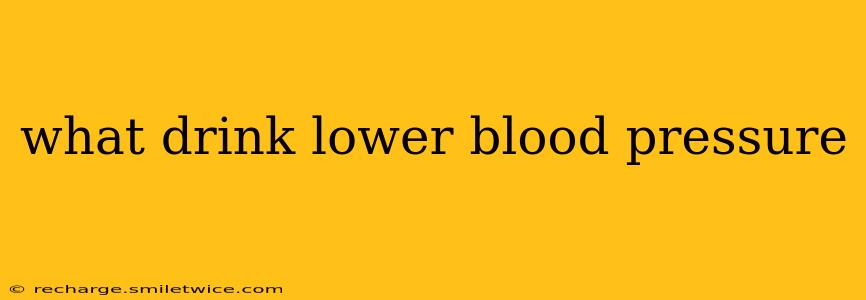High blood pressure, or hypertension, affects millions worldwide and is a significant risk factor for heart disease and stroke. While medication is often necessary to manage hypertension, dietary changes, including incorporating specific drinks, can play a crucial role in lowering blood pressure naturally. This comprehensive guide explores various beverages that can contribute to healthier blood pressure levels.
What are the best drinks to lower blood pressure?
Several drinks stand out for their potential to support healthy blood pressure. These include:
-
Water: This may seem obvious, but staying properly hydrated is crucial for overall health and blood pressure regulation. Dehydration can temporarily raise blood pressure, so ensure you're drinking enough water throughout the day. Aim for at least eight glasses.
-
Beetroot Juice: Beets are rich in nitrates, which convert to nitric oxide in the body. Nitric oxide helps relax and widen blood vessels, improving blood flow and lowering blood pressure. Studies have shown that consuming beetroot juice can lead to a significant, albeit temporary, reduction in blood pressure.
-
Pomegranate Juice: This delicious juice is packed with antioxidants and possesses anti-inflammatory properties. Some studies suggest pomegranate juice can help lower blood pressure and improve blood vessel function, although more research is needed to confirm these effects consistently.
-
Berry Juices (Cranberry, Blueberry, Strawberry): These juices are rich in antioxidants, which combat oxidative stress that can contribute to high blood pressure. Their anthocyanins contribute to overall cardiovascular health. However, be mindful of added sugars often found in commercially-produced juices.
Does hibiscus tea lower blood pressure?
Yes, hibiscus tea has gained popularity for its potential blood pressure-lowering effects. Studies indicate that hibiscus tea may help lower systolic and diastolic blood pressure. The active compounds in hibiscus are believed to be responsible for its hypotensive effects, although the exact mechanisms are still being investigated. It's important to note that the effect may vary depending on the concentration of the tea and individual factors.
What drinks raise blood pressure?
While many drinks can support healthy blood pressure, others can have the opposite effect. It’s crucial to limit or avoid these:
-
Sugary Drinks (Soda, Juice with Added Sugar, Sweetened Tea): These drinks are loaded with calories and sugar, contributing to weight gain and increasing the risk of high blood pressure.
-
Excessive Alcohol: Excessive alcohol consumption can raise blood pressure significantly. Moderate alcohol intake (if tolerated) might have some cardiovascular benefits, but exceeding recommended limits is detrimental.
-
Energy Drinks: These drinks often contain high levels of caffeine and sugar, which can lead to a temporary spike in blood pressure.
-
Coffee: While moderate coffee consumption isn't necessarily harmful for everyone, excessive caffeine intake can temporarily increase blood pressure.
Can drinking too much water raise your blood pressure?
While dehydration raises blood pressure, drinking excessive amounts of water very rapidly can potentially lead to a temporary increase in blood pressure. This is primarily due to an increase in blood volume. However, this effect is usually temporary and is not a concern for the majority of individuals who drink water regularly throughout the day. It's usually only a risk in situations of rapid, excessive water intake.
What else can I do to lower blood pressure besides changing my drinks?
Dietary changes are crucial in managing blood pressure. Beyond drinks, consider these factors:
-
DASH Diet: The Dietary Approaches to Stop Hypertension (DASH) diet emphasizes fruits, vegetables, whole grains, lean protein, and low-fat dairy. This diet is highly effective in lowering blood pressure.
-
Regular Exercise: Physical activity strengthens the heart and improves blood vessel function, helping to reduce blood pressure.
-
Stress Management: Chronic stress can contribute to high blood pressure. Practice stress-reducing techniques like yoga, meditation, or deep breathing exercises.
-
Weight Management: Maintaining a healthy weight is essential for managing blood pressure.
Disclaimer: This information is for general knowledge and does not constitute medical advice. Always consult with your doctor or a registered dietitian before making significant changes to your diet or treatment plan, especially if you have pre-existing health conditions. They can help you determine the best approach for managing your blood pressure safely and effectively.
